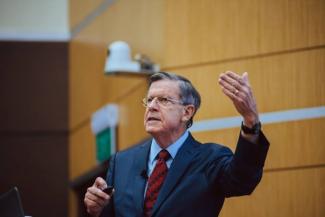
Happy people are successful across many life domains, including marriage, income, work performance, and health, suggested Prof Ed Diener, speaking at SMU. He said that happiness is linked to successful outcomes because when people experience positive moods and emotions, it signifies that life is going well, the person’s goals are being met, and resources are adequate.
Professor Diener was delivering the 26th lecture in SMU’s Presidential Distinguished Lecturer Series on 27 October 2016. He is Professor of Psychology at the University of Utah and the University of Virginia and Senior Scientist at the Gallup Organisation, and is widely known as “Dr Happiness”, for his lifetime of research on psychological well-being.
During the lecture, he said that in recent years, there has been a growing awareness that although economic indicators of progress are important, they cannot be relied on as the sole guide for public policy and to maximise societies’ quality of life. Measures of psychological well-being, including “happiness,” or how people feel about and appraise their lives, are gaining widespread recognition as a way of supplementing economic indicators in policy deliberations, he said. The well-being measures point to factors beyond GDP that influence the well-being in societies.

Members of the audience were happy to hear that Singapore scores well in factors that promote subjective well-being, according to Prof Diener’s research.
After briefly discussing the validity of the measures of well-being, he moved on to focus on why we need societal measures of well-being. Although personality has an effect on people’s well-being, a very large influence comes from the societies and communities in which people reside.
Professor Diener theorised that as societies grow in wealth, there is likely to be a growing concern for quality of life beyond money alone, and the well-being measures can help us create societies in which the well-being of citizens is high. He also reviewed some of the policies that have already been found to increase well-being, and the progress nations have made in adopting these measures.
After speaking for about an hour, SMU President Professor Arnoud De Meyer, who had made the welcome address, returned to the stage to moderate a discussion with Prof Diener and Professor of Psychology and Director of the Behavioural Sciences Institute at SMU David Chan. After inviting Prof Chan to comment on the lecture and asking his own question about some of the research, Prof De Meyer opened the dialogue to the floor. A slew of questions followed from an SMU undergraduate, alumnus, two faculty members and two Singapore civil servants on topics including the validity of well-being as a guide for public policy, whether there is the equivalent of the “GINI coefficient” for well-being; whether age, gender or religiosity affect one’s perceived level of well-being; how far temperament affects the perception of well-being; and the effect of terrorism on a society’s measures of well-being. The questions were answered in some detail by both professors, with Prof Chan providing local context and adding his own expert insights to Prof Diener’s knowledgeable responses.

Professor of Marketing and Senior Advisor to the President Tan Chin Tiong posing a question.

Professor of Psychology and Director of the Behavioural Sciences Institute at SMU David Chan added his own expert insights during the dialogue session.

Guests from government institutions were among those who asked questions.

(Left to right) Prof Chan, Prof DIener and Prof De Meyer during the dialogue.
In closing the event, Prof De Meyer said, “This was a very interesting lecture and set of questions. The lecture was an excellent example of how really well-grounded rigorous research can guide our thinking and policies about well-being. The relevance of the output of the research is also very important. It is a good model for what we as a university aspire to do.”

Prof Diener (centre) receiving a token of appreciation from Prof De Meyer (right), with Prof Chan (left).

Prof Diener poses for photos with guests after the lecture.

Prof Diener giving his autograph to a guest after the lecture.